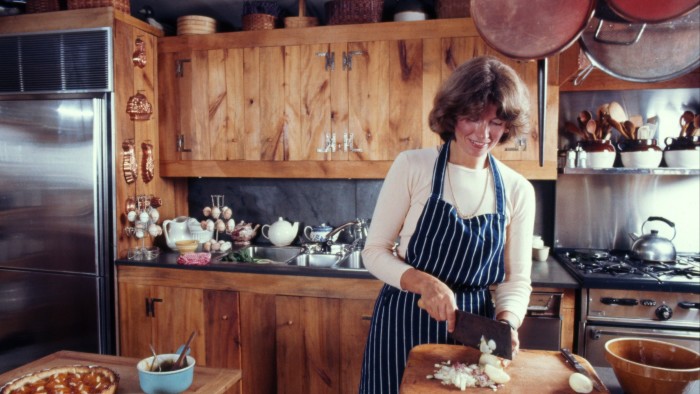Martha Stewart and the making of a modern American icon

Stay informed with free updates
Simply sign up to the Life & Arts myFT Digest — delivered directly to your inbox.
It’s a story about America, starring a self-made billionaire. A former stockbroker, they built an empire based on the cult of their personality, and then tapped working-class aspirations to see that empire soar. They seem stylish yet authoritarian, with little appetite for small talk and a reputation for being rude. A New Jersey native, and convicted felon. I am, of course, talking of Martha Stewart.
Martha, a new documentary about the wunder-hostess and homemaker, has debuted on Netflix at a moment in which we are debating what makes some people wildly popular despite a personality so flawed. For days now we have been picking over the success of Donald Trump’s electoral campaign, and how he persuaded people to vote for him in greater numbers than before. I urge you to look to Martha for clues as to his success: I found its insights more revealing about US myth-building and iconography than many other hand-wringing entreaties currently being offered on the theme.
The documentary is written and directed by RJ Cutler, who made The September Issue, about US Vogue, in 2009. He has made numerous other documentaries in the meantime, but his specialism is in unpicking the shibboleths of the cultural landscape and offering a peek at the humanity within. Or not. In fact, humanity doesn’t seem to count for much with powermongers: they prefer to preserve their mystique in favour of stylistic gestures — a haircut, a silhouette, a phrase.
Martha, the world’s most famous homemaker, is quite fabulously monstrous. By her own admission she found motherhood quite tiresome, was unfaithful during her marriage and hates much introspection. She is mean and overbearing. An avowed perfectionist. “I dislike waste, inefficiency, avoidance . . . purple,” she says to Cutler. “I dislike people . . . not paying attention to details.” The list goes on. And on.
Raised by a controlling, violent father, and a caring but remote mother, Stewart is arguably the product of her mid-century youth. She shudders from discussion of vulnerability. She doesn’t “care” for how people are feeling, she tells the camera: she cares for the people that “do”. My favourite scenes are those in which we see her marching through the many hectares of her vast Hampton estate, in leather trousers, recording instructions to her gardener on voice notes: “It’s October 18th . . . I would like to lay the path to the summerhouse garden from the main road. I think we should do rust stones like the other path. Send.”
Apparently, Stewart was unhappy with the film because the closing scenes were shot when she was nursing a leg injury and she baulked at being seen as infirm. She also thought the choice of music was “lousy” and should have featured more rap, such as that produced by her best friend Snoop Dogg.
In any other week, the Martha documentary would have been a fun study. In the week of the election, it helped crystallise my feelings about Trump. People may not like him. They may not agree with him. His ramblings are preposterous and offensive. His super-rich privilege is egregious. But, like Martha, he remains a 24-carat-gold celebrity.

And people love celebrity, regardless of almost all else. Most people still couldn’t name Kamala Harris as they headed to the voting station, she remained a complete unknown for the biggest voting groups. Both Trump and Stewart built their brands downwards, to create a massive base. Stewart’s early stroke of genius was to immerse herself within a demographic that could only dream of crudités tables and banqueting bouquets. And yet the Kmart deal she signed in the late-1990s brought her straight into the homes of the store’s 77mn monthly customers (as she claimed to David Letterman) and turned her into a household name. She wasn’t snobby about her clients. She didn’t sneer at them. If they wanted to recreate her gastronomic efforts, she gave them plates, and cake.
Stewart was a disrupter, happy to work outside her bubble and unprecious in her quest for visibility. Her first TV appearance post jail time (she served five months at “Camp Cupcake” in 2004 for offences linked to a stock trading scandal) was The Apprentice: Martha Stewart, produced by Mark Burnett, Jay Bienstock and Donald Trump.
Stewart endorsed Harris in this year’s election, having demurred from an endorsement four years ago. She fell out with Trump over the TV show. But in many ways the duo represent the same strange archetype in US cultural iconography. Both are near caricatures in persona, but their inner selves are masked. They appeal to the everyman, but show no signs of relatability. They have known and embraced humiliation, and have turned their failures into wins. Like Trump, Stewart clung to her innocence throughout her court trial, and has maintained a magisterial denial ever since.
Stewart is not especially pleasant, but she is fascinating. She’s impressive in demeanour, in composure, and in her gall. A constant in the cultural dialogue since the ’70s (4.9mn followers on Instagram etc), she’s still unusually relevant, and will go to extraordinary lengths to remain in the domain — see her becoming the oldest person to star on the swimsuit issue of Sports Illustrated magazine.
Perhaps the biggest error in this current era is that we’ve grossly overrated the value of likeability. Perhaps we’ve all become so preoccupied by being inoffensive and not upsetting others that we’ve forgotten how to lead. Stewart has become an icon by remaining her awkward, controlling and surprisingly amusing self. On which note: “There seem to be some dead peonies, which makes me very unhappy. Send.”
Email Jo at [email protected]
Find out about our latest stories first — follow FTWeekend on Instagram and X, and subscribe to our podcast Life and Art wherever you listen
#Martha #Stewart #making #modern #American #icon




